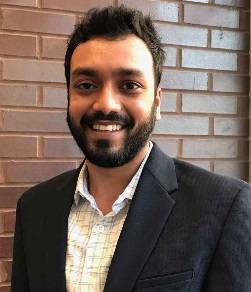Q. What are you currently pursuing?
Shrikant: I am a second-semester graduate student from India at Cleveland State University, pursuing a Master of Information Systems with a focus on data engineering.
Q. What were your main reasons for choosing Cleveland State University over other universities in the US?
Shrikant: Compared to other US universities, Cleveland State's affordability, quality of academics, and strong outcomes made the school a smart choice for my individualistic goals. The university also offered unique courses that met my career objectives, including data mining, big data, advanced big data, and analytics. These interested me and Cleveland State was offering them, so I made my decision.
Q. How would you describe your internship with Koch Disruptive Technologies? How did it affect your professional growth?
Shrikant: During my internship, I was able to meet both international and domestic students from multiple universities. This gave me exposure to working with people from different cultures and backgrounds, while also gaining valuable skills through daily responsibilities. I was also able to leverage my unique knowledge and cultural background to support others with their projects.
Sharing an anecdote, Shrikant says, One guy had an agricultural project and he didn’t have that much knowledge about agriculture, but since I’m from India and I know how agriculture works and what are the different avenues for agriculture, what are the difficulties in agriculture, I offered to help.
Q. What would you say was your biggest takeaway from the internship?
Shrikant: One of my biggest learnings from the experience was how to stay motivated and competitive in a demanding workforce. You learn who you’re competing with. If you’re in your bubble, you probably won’t understand the competition. But once you are out there, you know other people will be smarter than you. You need to make certain efforts to match up with the skillset that other people have, who are applying for the same job.
Q. What are your professional plans?
Shrikant: I am currently interviewing with several employers for roles where I can gain professional experience, even in areas outside data science. I am also utilizing my professional network to explore even more opportunities and recommend that other students do the same.
Q. What would be your advice for international students looking for internships or jobs?
Shrikant: I would urge international students to explore different types of job roles and work experience opportunities, especially when just starting out. Don’t get stuck to one field. Of course, I want to be a data engineer, but I am applying for multiple roles. It doesn’t matter where you are or what you want to do, you can get there eventually. Just get into some internship. Don’t waste time!”
Also, Read
What is Optional Practical Training (OPT)?
Optional Practical Training is temporary employment that is directly related to an F-1 student's major area of study. OPT allows international students with an F-1 Visa to work for up to 12 months in their area of study. Eligible students can apply for OPT employment authorization before completing their studies (pre-condition) or after completing their studies (post-completion). Although students are allowed to work for 12 months, however, students with a STEM degree are allowed to extend it to 17 months. Moreover, all periods of pre-completion OPT will be deducted from the available period of post-completion OPT.
Optional Practical Training (OPT) features:
- OPT is a one-year work permit given to students after completing a degree programme in the US. You have to find a job within 90 days after graduation.
- OPT may be used during one’s studies (PreCompletion OPT) and after completing one’s studies (Post-Completion OPT). Pre-Completion OPT allows you to work legally before graduation, in case you have finished the entire duration of your CPT period.
- Technically, the job must be directly related to one’s major field of study.
- No course registration is required.
- OPT is not semester-specific.
- Pre-Completion OPT may be part-time (20 hours per week) when college is in session, full-time during school breaks (winter or summer) or completely full-time (when working on one’s thesis/dissertation). Post-Completion OPT may be authorized for full-time employment.
- OPT is not employer-specific and the student can work for any employer as long as the position is related to their field of study.
- International Student and Scholar Services (ISSS) and USCIS both must authorize OPT. The ISSS issues a new I-20 with OPT recommendation. USCIS then issues Employment Authorization Document (EAD) card.
- Processing times for OPT may vary, but it generally takes between 1 to 3 months.
- Employment is permitted during the validity dates on the EAD card, after that, you will have to apply for an H1 visa (work visa).
- USCIS requires a $380 application fee to issue the EAD card.
Related Reads
 Starting research
Starting research Shortlisting colleges
Shortlisting colleges Exam preparation
Exam preparation SOP/LOR writing
SOP/LOR writing Scholarship & finance
Scholarship & finance Visa application
Visa application



The university offers a top-notch environment, the best academic opportunities, technical & career training, etc. The university boasts over 1000 international students who represent more than 95 countries. Additionally, international students highly enjoy the facilities provided by the University of North Dakota. The UND is one of the largest research universities in the United States for international students.